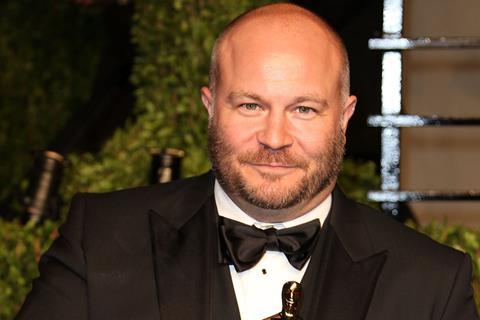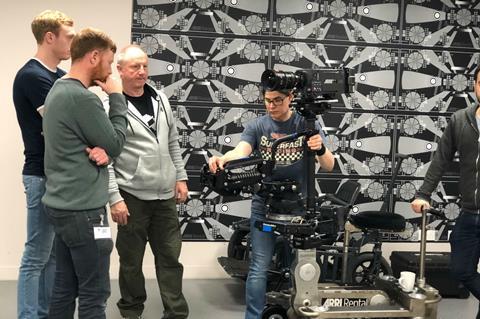Oscar-winning producer Gareth Ellis-Unwin believes his experiences in the filmmaking trenches will prove vital in his new Creative Skillset role, and deepen industry engagement.

Gareth Ellis-Unwin’s passion for widening opportunity in the UK film industry is inspired by his own personal journey. Despite growing up just six miles from Pinewood Studios, and working there at weekends and during school holidays as a teenager, his patchy academic record was seen by his school careers counsellor as a bar to any chance of finding work in the film industry.
“I had a massive love for film; it was all I ever wanted to do,” he says. “And I was basically told: get ready to work for Mars on the Slough trading estate, because that world of film, that’s for the elite, the intelligentsia.”
It was only by chance, accompanying his younger sister to her interview to study for A-levels at Weymouth College, that his eyes were opened when he witnessed students running around the campus wielding video cameras. He too applied for a place at the college, studying for a BTec national diploma in media, then going on to complete a BTec HND in programme operations at Ravensbourne college. His vocational education set the film enthusiast on a path to become an assistant director and eventually producer — culminating in winning a Best Picture Oscar for The King’s Speech. Now he’s placed that producing career on pause in order to take up a full-time post as head of film at Creative Skillset — a role that requires him to deliver on the BFI’s film skills strategy.
“I’ve always had an engagement with training,” explains Ellis-Unwin, who has worked with Irish charity Cinemagic, Farnborough College, Winchester University and his own alma mater, Ravensbourne. “I just got to the point where I didn’t want to comment from the sidelines any more.”
Read more:
Creative Skillset CEO Seetha Kumar interview
Six urgent challenges for Creative Skillset
Speaking to Screen International in Creative Skillset’s London offices on day five of his new role, he adds: “I was fed up of this organisation being used as the industry piñata: it’s hit when you want some cash, to shake some bursaries out for some funding. So I wanted to come in, support, be an agent for change. It’s not about me shaping and forming myself to suddenly become this public-funding apparatchik. This organisation has turned to me, as an Oscar-winning producer, and has said, ‘Come in and help us deliver on this 10-point plan, speak to the industry, have profile, raise the visibility, champion the work that we are doing.’ And that was a very seductive offer.”
Plugging the skills gap
Ellis-Unwin’s most urgent task is to focus on addressing the UK film industry’s widely recognised skills gap. But just as vital is a new responsibility included in the BFI 10-point plan: skills forecasting. As he puts it: “How do we develop strategies that will ensure that we are seeing from three, four, five years out where some of these gaps might come to exist, and what are we doing to make sure that we are training people, or stepping people up, or working as an agile industry to make sure that there aren’t those gaping holes?”
To deliver on the BFI plan, as well as to continue existing activities funded by the film production levy, Ellis-Unwin will need a significantly bigger team than the one that reported to his predecessor in the post, and he’s in the process of making those hires. Already appointed are four key roles: Pinewood Group’s Jules Robinson is joining as head of business development; Mark Heholt, formerly head of apprenticeships at the Tech Partnership, will serve as head of policy; Caterina Branzanti arrives from the BFI as head of research; and Michelle Moon Lim is the new inclusivity manager, having worked in diversity-related roles at organisations including Société Générale and Stonewall.

In total, Ellis-Unwin will lead a film team of 20. As he explains: “There are new activities, new ambitions. The BFI recognises that to deliver what was being asked of us to the quality that was expected of us, it would take a significant management team resource.”
Widening inclusivity
Points six, seven and eight of the BFI plan — covering mentoring, bursaries and the establishing of new ‘centres of excellence’ across the nations and regions — all speak to the BFI and Creative Skillset’s renewed focus on building a workforce that reflects its audience. In a word: inclusivity.
While Ellis-Unwin can relate to the social mobility challenge on a personal level (“It’s trying to fix the problem I faced at 16”), he agrees that inclusivity relates to a broader mix of issues. “I recognise that I am a balding, slightly tubby middle-aged white guy, sitting in an office telling people about how we have an ambition to be inclusive. The truth is, it has to go across all factors: race, gender, disability, social mobility. The idea of establishing this pan-UK network, where we have hubs in a number of different cities, is part of that agenda. Through these hubs, we will deliver continuing professional development, short courses, and help people who want to retrain or develop new skills. We will also base the localised mentoring through the hubs, and the apprenticeships and bursaries will have an attachment there.”
Local intelligence has another upside, he explains. “Partners I’ve been talking to in Northern Ireland have skills shortages that aren’t the case up in Yorkshire or Scotland. That ability to react in a localised form is one of the important attributes of the network. Apparently, the streets of Belfast are awash with make-up assistants, but you can’t find a location manager for love nor money because Game Of Thrones has soaked up everybody.”
As a producer operating in the independent space, Ellis-Unwin was well aware of his peers’ perceptions of Creative Skillset, and two criticisms were often articulated: “The often-cast stones were things such as not paying attention to industry, and also that this was a very bureaucratic environment.” Ellis-Unwin hopes that his appointment speaks for itself regarding Skillset’s renewed focus on industry. As for a lack of agility, so far this has not been his experience. “In my first week, we’ve commissioned five new courses that will roll out over the course of the next few months. I’ve been afforded ample freedoms,” he says.
Ellis-Unwin sees industry engagement as a two-way street, and UK practitioners can expect to be hearing from him soon. “I really want to build this feeling that doing good feels good, so being part of a mentoring scheme — providing training, taking on board an apprentice — I really want to mobilise the industry to join us in working hard to address a number of these challenges. If we are trying to do something pan-industry, pan-UK, it’s going to take a really collegiate spirit to engage with that.”







![The Brightest SunScreen[Courtesy HKIFF]](https://d1nslcd7m2225b.cloudfront.net/Pictures/274x183/3/5/0/1448350_thebrightestsunscreencourtesyhkiff_312678.jpg)

















No comments yet